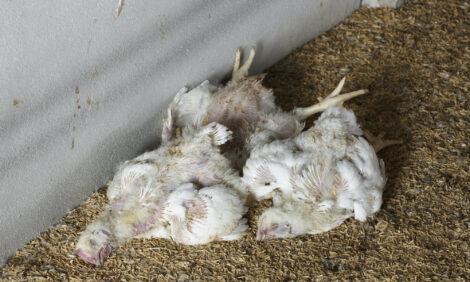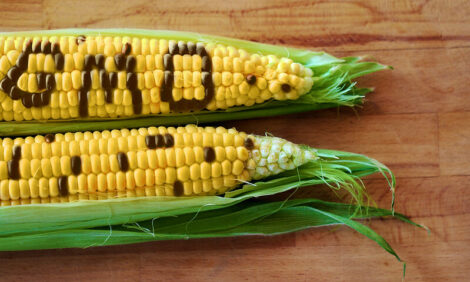



Eminent US professor urges UK not to dilute animal welfare standards in post-Brexit trade deals
An eminent American professor of large animal medicine has warned the UK not to dilute its high animal welfare standards for future trade deals with the US.Jim Reynolds, a Professor of Large Animal Medicine and Welfare at Western University of Health Sciences in California, was speaking at a thought-provoking debate on farm animal welfare standards at the Animal Welfare Foundation’s (AWF) annual Discussion Forum in London last week (5 June).
When asked about the feasibility of the UK setting high animal welfare standards for US farms to meet as part of any future trade negotiations, Professor Reynolds told a packed audience of vets and animal welfare scientists: “If you're asking advice from an American on farm economics, it is: ‘don't give up what you have’. What you have here is a high-welfare market with a high value to your products. I hope you don't let that slip.”
He added that maintaining the UK’s current high welfare standards in any post-Brexit trade deals could help pressure the US to change its own. “Our system has changed over the years from a supply management system to a commodity-based system in which the profit margins are low…so America's looking desperately to export low-value products. That's how we make money. Keep your high-welfare, high-value products because that's something we can attain to. Our welfare programmes come from here (the UK) to us.”
His remarks came towards the close of AWF Discussion Forum’s Big Debate, which had asked the question: "UK farming: is welfare good enough?" David Main, Professor of Production Animal Health and Welfare at the Royal Agricultural University, was first on the stage to argue that the UK had some of the highest welfare standards globally. He highlighted the country’s high consumer expectations and applauded the livestock industry for helping establish world-leading farm assurance standards. However, he pointed out that more could be done by the UK to be world leading when it came to delivering welfare outcomes for farmed animals.
“’Animal welfare is GREAT’ needs to be our claim in any trade negotiations,” Professor Main said, referencing the government’s ‘GREAT Britain’ campaign slogan. He also countered US Ambassador Woody Johnson’s comments earlier this year, when he urged the UK to leave the EU's 'Museum of Agriculture' and dismissed 'misleading scare-stories' about American agriculture. “Citizens here in the UK want certain minimum, consistent production standards. And they are willing to pay for higher welfare produce.”
Professor Reynolds, on the other hand, argued that while the UK had high welfare standards, the issue was confidence in whether they represented animals in all circumstances and whether assurance schemes took into account the lives of the animals. He also stressed that the size of a farm was not an automatic indicator of welfare, arguing that the economies of scale, as seen on large farms in the US, allowed for better and more specialised staff training, biosecurity protocols and early disease detection. “Animal welfare comes down to people having compassion,” he said.
Both speakers agreed that vets played a key role as advocates for animals, even if that required speaking uncomfortable truths on issues such as tail docking or beak trimming. They also gave a shout-out to the British Veterinary Association’s ‘less and better’ policy position on meat consumption as key to improving livestock animal welfare, highlighting the importance of seeing meat eating as a privilege and hence valued as such.
AWF Chair of Trustees Chris Laurence said:
“The welfare of animals on farms is more than just providing for their needs but whether they have a good life, and the manner in which they are managed is critical to that. The British public recognise that recent issues highlighted during the Brexit debate, such as sentience and the import of food from other countries like the US, have a major effect on the welfare of animals used for food production.
“The debate highlighted those issues, particularly the skill and knowledge of the people who look after farmed animals of all species and the complexity of assessing welfare. How those assessments can be presented to consumers remains an interesting debate.”
One of the best-loved CPD events of the veterinary calendar, the Discussion Forum invites experts from around the world to discuss key issues impacting animal welfare today. For the first time, this year’s sessions featured a formal debate style, with experts speaking for and against a motion before opening the floor to questions and views from the audience.
The farm animal welfare debate was followed by a debate on whether the welfare needs of exotic animals can be met? in captivity. Internationally renowned specialist zoo and wildlife vet Romain Pizzi, exotics vet Tariq Abou-Zahr and the Born Free Foundation’s Dr Chris Draper and Mark Jones took opposing stances on the issue, looking at the complexity of husbandry requirements of exotic animals, the suitability of current animal welfare assessment frameworks, and the ‘greater good’ of conservation and breeding programmes, among other themes.
Other talks during the day included a discussion on clinical excellence and overtreatment in human and veterinary sectors and a presentation from Professor Cathy Dwyer, Director of the Jeanne Marchig International Centre for Animal Welfare Education, on the findings from the AWF-funded Delphi research on the UK’s top animal welfare concerns.
Following the event, AWF and the British Veterinary Association jointly hosted a reception at the House of Commons, offering delegates the opportunity to continue discussing the day’s issues with parliamentarians and policymakers.
Videos of all talks are available to view here
For more on the AWF Discussion Forum, click here
Listen to Professor Main and Professor Reynolds talk to BBC Farming Today on the morning of the AWF debate:










